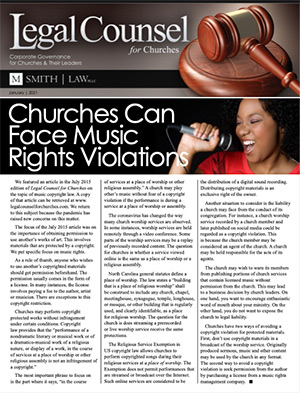Church leaders have a fiduciary responsibility to make decisions that reflect the best interest of their ministry. This commitment is called the Duty of Care. The Duty of Care is a legal directive that corporate managers act in a reasonable manner.
What a court considers reasonable depends on how they believe others would act under similar circumstances. The Reasonableness Test is not limited to business leaders only. A court may hold church leaders to the same standard as an officer of any other organization.
Most organizations view growth as a necessary metric. Growth indicates the health and prospects of an organization. Growth allows a company to keep pace with its competitors. The increased revenue from growth provides funding for strategic investments, infrastructure improvements and rising operating expenses.
There is a pragmatic reason for church growth. The growth of new members injects new talent and funding for ministry work. A growing church is better able to fulfill its financial obligations and sustain itself for the future. Churches that cease growing often cannibalize their reserves. Dwindling resources can hamper a church’s ability to operate in the long term.
Growth is often a philosophical concern for church leaders as well. The spread of their faith to unbelievers is an important reason for reaching new audiences. In addition, churches that endeavor to serve their congregations with social programs need growth for the increasing demands of their communities. As new members join the church, the church’s purpose is better able to be fulfilled. The absence of growth could lead to organizational ineffectiveness.
An ineffective organization can be seen as an indictment of the corporate leaders to fulfill the mission. When it comes to a church, stagnant growth suggests the leaders have not accomplished a key fiduciary duty to grow. For this reason, church leaders should spend a considerable amount of effort exploring strategies for growth.
Growth for most organizations require an intentional focus on expanding their businesses. These leaders must understand their markets, customer demands and craft strategies that will draw new audiences. The demand for churches may not be different.
Church leaders face the same financial realities as most organizations. Growth is an important factor. This includes understanding what key elements of the ministry attract new members. To ensure growth for the future, churches have a duty to make decisions that help the ministry fulfill its corporate existence.
When church leaders consider growth, a few important questions should be asked. What policies and procedures exist that limit the church’s ability to grow? Does the church invest enough in new technology and practices that help spur growth? How will financial stewardship be affected if growth languishes?
Church leaders should develop and monitor key metrics that measure growth. These factors include number of new members joining the church, the attrition rate of members who leave the church, demographics of new members, migration trends and attendance fluctuations. Attention to data analytics is how church leaders can gain insight into activities that affect overall growth.
Because growth is such an important governance issue for church leaders, the topic should be a regular item on board meeting agendas. Board discussions assure church leaders keep the issue of growth in focus. Furthermore, healthy strategic conversations about growth helps ensures leaders fulfill their fiduciary duty to always make the most prudent decisions for their churches.

